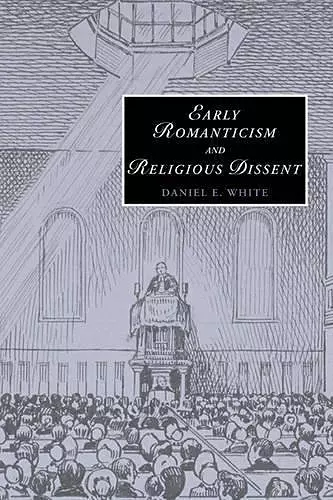Early Romanticism and Religious Dissent
Format:Paperback
Publisher:Cambridge University Press
Published:10th Jun '10
Currently unavailable, and unfortunately no date known when it will be back
This paperback is available in another edition too:
- Hardback£90.00(9780521858953)

White provides a new context for Romantic literature by explaining the key influence of religious dissent.
Religious diversity and ferment characterize the period that gave rise to Romanticism in England. Daniel White provides a clear and useful introduction to religious Dissenting communities and analyzes how Dissent shaped the work of William Godwin, Mary Wollstonecraft, Samuel Taylor Coleridge, and Robert Southey.Religious diversity and ferment characterize the period that gave rise to Romanticism in England. It is generally known that many individuals who contributed to the new literatures of the late eighteenth century came from Dissenting backgrounds, but we nonetheless often underestimate the full significance of nonconformist beliefs and practices during this period. Daniel White provides a clear and useful introduction to Dissenting communities, focusing on Anna Barbauld and her familial network of heterodox 'liberal' Dissenters whose religious, literary, educational, political, and economic activities shaped the public culture of early Romanticism in England. He goes on to analyze the roles of nonconformity within the lives and writings of William Godwin, Mary Wollstonecraft, Samuel Taylor Coleridge, and Robert Southey, offering a Dissenting genealogy of the Romantic movement.
Review of the hardback: '…White intricately and skilfully demonstrates, informs Romantic creativity in ways we are still learning to appreciate.' BARS Bulletin and Review
Review of the hardback: 'Professor White's scholarly book is welcome evidence of the healthy state of studies of late eighteenth and early nineteenth century English Dissent ... a contribution to Unitarian history which will certainly be of interest to readers.' Transactions of the Unitarian Historical Society
ISBN: 9780521153225
Dimensions: 229mm x 152mm x 17mm
Weight: 430g
288 pages